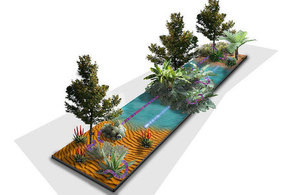APHA garden at RHS Chelsea Flower Show highlights global pest threats
Novel garden at RHS Chelsea 2015 highlights how sentinel trees are being used to detect global plant pest and disease threats.

RHS Chelsea 2015 image
The garden is called Beyond Our Borders and has been commissioned by the Animal and Plant Health Agency (APHA).
It shows how the UK government is working with overseas botanic gardens to protect our environment against alien pest and diseases.
Plant sentinels
Iconic British tree species are being used as ‘early warning’ sentinels (soldier or guard) in regions throughout the world to monitor and identify potential new plant pest and diseases that could threaten our natural environment.
British trees have been planted in other countries where pests and diseases are present, and are monitored to see what affects the pests and diseases might have on them. Because our native trees do not have natural resistance built up to these threats, they are more likely to be severely affected.
The project is designed to establish which pests and diseases post the biggest threat to British species, and this information is used to inform plans for prevention, eradication and control.
Garden design
In the Fresh Garden section, the eye-catching and innovative display features three different climatic zones (Australasia, Tropical and Arid) divided by water features representing oceans.
Each zone contains a single iconic UK native tree sentinel standing among plants native to each climate.
Set within the plants of each zone are coloured springs representing plant pest and diseases. These appear to emerge and disappear and some are stretched to create a wave motion over the top of each ocean. This represents the movement of plant pests and diseases within and between each zone, reflecting the threat to plant health.
See
Garden designer Sarah Eberle commented:
“The inspiration for the garden came from a new international project, led by the UK, aimed at creating a network of tree sentinels in botanical parks and gardens around the world.
“I wanted to illustrate the danger of the transfer of plant pests and diseases across international borders and have done this by using springs to represent the plant pests and diseases, which are elusive and mobile.”
Pests and diseases
In the last few years, a number of new pests and diseases have emerged as significant risks to trees and plants in the UK including:
- Chalara fraxinea (Ash dieback)
- Phytophthora spp.
- Oak Processionary Moth
- Asian longhorn beetle
Pests and diseases like these may not be significant in their native countries because:
- host plants may be more resistant, having grown up alongside them over thousands of years
- natural predators may be present
- environmental conditions can be different
However, plants and trees in the UK may have little or no natural resistance, natural controls may not be present and the surrounding environment is different.
Head of Plant Health Public Engagement at the APHA, Paul Beales, said:
“The issue of the increase in the arrival, establishment and spread of plant pests is a global one, largely due to international trade and travel, and needs to be tackled as such.
“The garden represents the need to work together and share information and knowledge on an international scale.”
Government action
Safeguarding plants and trees from pests and diseases is one of Defra’s four top priorities. Decisive action is being taken to help protect against the introduction and spread of plant pests and diseases.
APHA is working with Botanic Gardens Conservation International (BGCI), as part of the International Plant Sentinel Network project. The network monitors tree sentinels in international botanic gardens and arboreta for damage by pests and diseases native to that country. It will help to:
- identify potential threats to native UK plants and trees before they are introduced
- improve the chances of eradication or control programmes
- stop their introduction in the first place
How you can help
Sentinel
A sentinel is:
- a soldier or guard whose job is to stand and keep watch
- an indicator of the presence of disease
Everyone can help conserve the UK environment be keeping an eye out for any serious pests and diseases that could threaten our plants and trees. You can do this by taking part in the OPAL (Open Air Laboratories network) Tree Health Survey.
To help prevent the spread of plant pests and disease within and Beyond Our Borders you should:
- buy UK-produced seeds and plants where possible
- avoid bringing seeds, plants or cuttings home from trips abroad
- preferably plant small and enjoy watching your garden grow
- become familiar with new pest and disease threats, their hosts and symptoms
Defra Chief Plant Health Officer, Nicola Spence, said:
“It’s great that this year’s garden highlights the important work going on to identify, prevent and tackle pests and diseases that can harm our native plants and trees.
“There are simple steps everyone can help with, such as keeping a look out for signs and reporting sightings of tree pests and diseases, and not bringing back plants from abroad, which will help to protect our countryside and wildlife.”
Sponsors of the garden include Defra, the Shanghai Botanical Garden, Horticultural Trades Association and the Scottish Government.